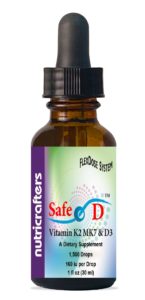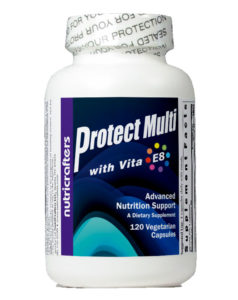Writing in the October 2009 issue of the American Journal of Clinical Nutrition, Dr. Bruce Ames and his research team from Children’s Hospital Oakland Research Institute in Oakland, California, said that current recommendations for vitamin K intakes need to be increased to prevent disease and ensure optimal health.
Operating under the “triage” theory for micronutrients—a theory that suggests the body prioritizes the use of scarce micronutrients like vitamin K in favor of short-term survival at the expense of long-term health—the researchers looked at the consequences of vitamin K restriction amongst vitamin K-dependent proteins.
What they found was truly frightening. When the supply of vitamin K was limited, as it is in the typical American diet, the body utilizes it to protect critical metabolic functions in the liver. Unfortunately, that leaves other vitamin K-dependent proteins, the ones associated with bone building, cancer prevention, and protecting the heart from atherosclerosis, without sufficient vitamin K to function properly.
The result of this deficiency leaves the body at risk for developing age-related disease like cancer, heart disease, and osteoporosis.
The researchers noted that vitamin K deficiency was quite widespread. In addition to the lack of vitamin K in the diet, most multivitamin supplements contain little if any vitamin K. They also pointed out that anticoagulants like warfarin/coumadin also contribute to vitamin K deficiency.

“A triage perspective reinforces recommendations of some experts that much of the population and warfarin/coumadin patients may not receive sufficient vitamin K for optimal function of vitamin K-dependent proteins that are important to maintain long-term health,” wrote the researchers.
It is important to note, that while this study looked at the body’s vitamin K usage as a whole, there are actually two forms of vitamin K, known as vitamin K1 (phylloquinone) and vitamin K2 (menaquinone).
In other studies regarding vitamin K, researchers found that vitamin K2, but not K1, significantly reduced the risk of cardiovascular disease by 57%, death from all causes by 26%, and severe aortic calcification by 52%. Vitamin K1, on the other hand, did not provide significant cardiovascular protection.
Vitamin K1 is found in green leafy vegetables such as lettuce, broccoli and spinach, and makes up about 90% of the vitamin K consumed in the diet. Vitamin K2 accounts for the other 10% and can be found in meat, and fermented food products like cheese, and natto. However, as stated before, most people do not get enough vitamin K (both K1 and K2) from food sources and this deficiency is putting the vast majority of the population at risk for age-related disease.

Please review the following article for a technical overview of vitamin K or review some of the related articles below.
Vitamin K2: Optimal Levels Essential for the Prevention of Age-Associated Chronic Disease
Related Articles
- Dr. Bruce Ames Proves His Triage Theory of Micronutrients with Vitamin K
- Vitamin K2 (menaquinone-7) Protects Against Heart Disease
- The Heart, Bone and Skin Health Benefits of Vitamin K2
- Vitamin K2 (menaquinone-7) Reduces Risk of Prostate Cancer
- Vitamin K Deficiency Contributes To Age-Related Diseases
- Vitamin K—Keeps Calcium Out of Your Arteries and In Your Bones
- Vitamin K2 is More Important in the Fight Against Osteoporosis than Calcium
- Vitamin K2 (Menaquinone-7) Can Prevent Osteoporosis!
- Vitamin K2 (menaquinone-7) Protects Against Heart Disease
- Vitamin K Deficiency Contributes To Age-Related Diseases
